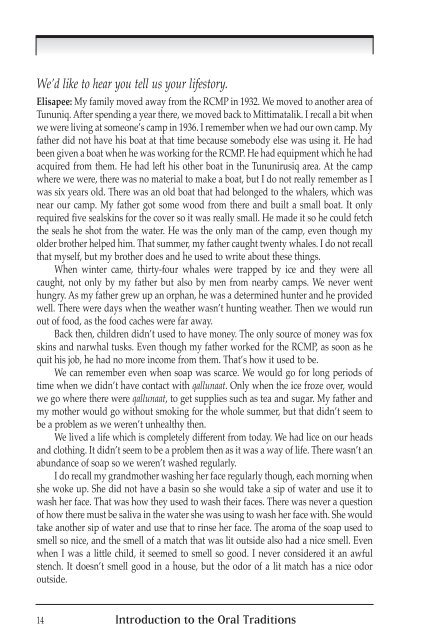Introduction-E
Introduction-E
Introduction-E
You also want an ePaper? Increase the reach of your titles
YUMPU automatically turns print PDFs into web optimized ePapers that Google loves.
We’d like to hear you tell us your lifestory.<br />
Elisapee: My family moved away from the RCMP in 1932. We moved to another area of<br />
Tununiq. After spending a year there, we moved back to Mittimatalik. I recall a bit when<br />
we were living at someone’s camp in 1936. I remember when we had our own camp. My<br />
father did not have his boat at that time because somebody else was using it. He had<br />
been given a boat when he was working for the RCMP. He had equipment which he had<br />
acquired from them. He had left his other boat in the Tununirusiq area. At the camp<br />
where we were, there was no material to make a boat, but I do not really remember as I<br />
was six years old. There was an old boat that had belonged to the whalers, which was<br />
near our camp. My father got some wood from there and built a small boat. It only<br />
required five sealskins for the cover so it was really small. He made it so he could fetch<br />
the seals he shot from the water. He was the only man of the camp, even though my<br />
older brother helped him. That summer, my father caught twenty whales. I do not recall<br />
that myself, but my brother does and he used to write about these things.<br />
When winter came, thirty-four whales were trapped by ice and they were all<br />
caught, not only by my father but also by men from nearby camps. We never went<br />
hungry. As my father grew up an orphan, he was a determined hunter and he provided<br />
well. There were days when the weather wasn’t hunting weather. Then we would run<br />
out of food, as the food caches were far away.<br />
Back then, children didn’t used to have money. The only source of money was fox<br />
skins and narwhal tusks. Even though my father worked for the RCMP, as soon as he<br />
quit his job, he had no more income from them. That’s how it used to be.<br />
We can remember even when soap was scarce. We would go for long periods of<br />
time when we didn’t have contact with qallunaat. Only when the ice froze over, would<br />
we go where there were qallunaat, to get supplies such as tea and sugar. My father and<br />
my mother would go without smoking for the whole summer, but that didn’t seem to<br />
be a problem as we weren’t unhealthy then.<br />
We lived a life which is completely different from today. We had lice on our heads<br />
and clothing. It didn’t seem to be a problem then as it was a way of life. There wasn’t an<br />
abundance of soap so we weren’t washed regularly.<br />
I do recall my grandmother washing her face regularly though, each morning when<br />
she woke up. She did not have a basin so she would take a sip of water and use it to<br />
wash her face. That was how they used to wash their faces. There was never a question<br />
of how there must be saliva in the water she was using to wash her face with. She would<br />
take another sip of water and use that to rinse her face. The aroma of the soap used to<br />
smell so nice, and the smell of a match that was lit outside also had a nice smell. Even<br />
when I was a little child, it seemed to smell so good. I never considered it an awful<br />
stench. It doesn’t smell good in a house, but the odor of a lit match has a nice odor<br />
outside.<br />
14 <strong>Introduction</strong> to the Oral Traditions


